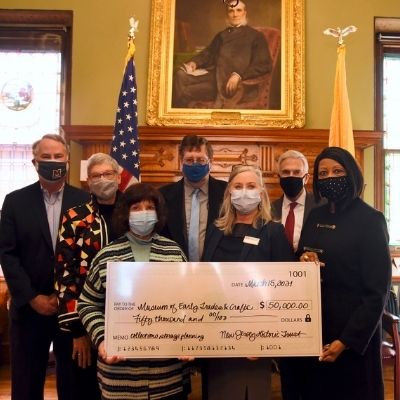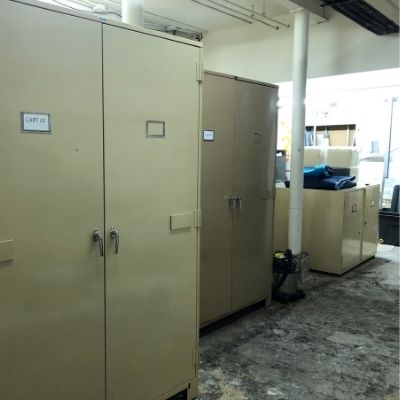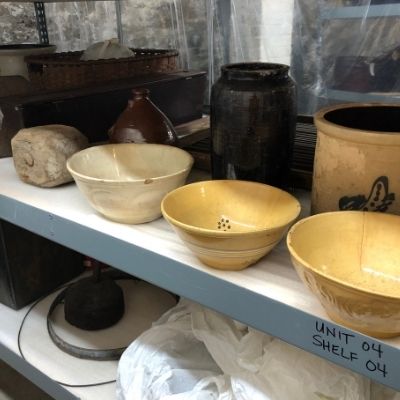The Collection
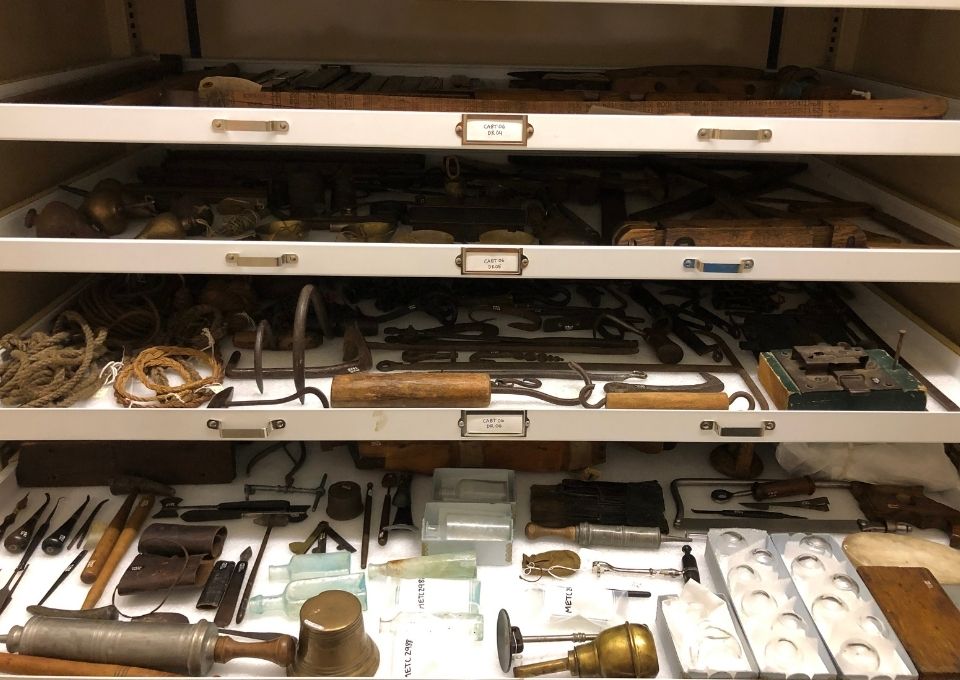
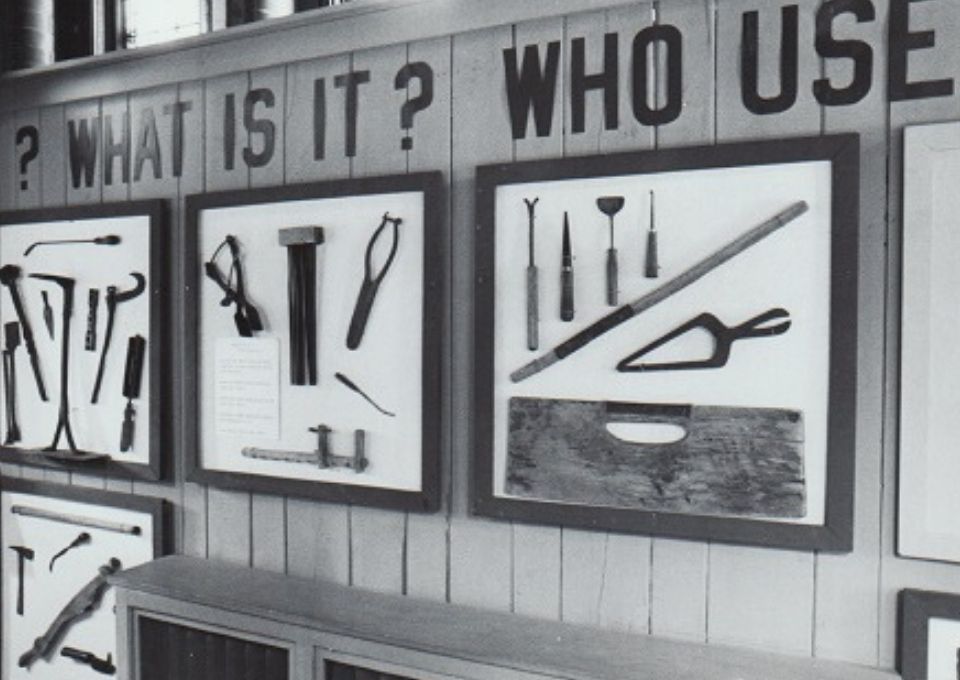
METC's Collection
The Museum of Early Trades & Crafts collection of over 8,900 artifacts, archival material, and library holdings reflects the dynamic story of home, shop, and farm trades during the 18th and 19th century. METC’s collection embodies the livelihood of an object from production in a shop to use in the home. These artifacts were made or used in New Jersey, and the surrounding states of New York, Pennsylvania, and Delaware.
Over the past 50 years, METC has added to its collection through donations or purchases; however, the core of METC’s collection represents a comprehensive and dedicated approach to New Jersey’s development from early settlement to industrialization assembled by the Museum’s founders Edgar and Agnes Land.
Objects
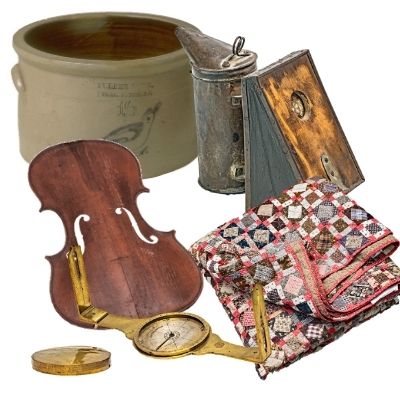
With over 40 trades represented, the collection illustrates the depth and breadth of historic trades in New Jersey before the advent of the Industrial Revolution. Objects are made from a variety of materials including wood, tin, iron, leather, brass, horn, straw, glass, clay, paper, silk, and cotton. Specific strengths in the collection include tools, production surfaces, and final products from the woodworking, metalworking, shoemaking, farming, and textile-making trades.
Archives
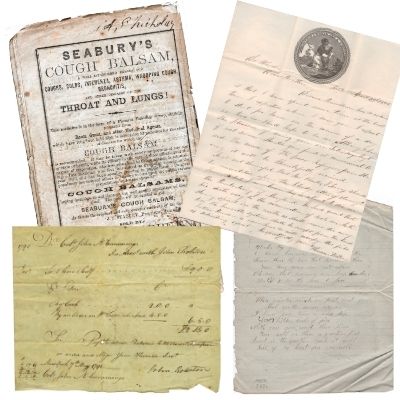
METC’s archival collection complements the permanent collection with over 1000 historical records. These include account books, letters, deeds, contracts, receipts, advertisements, maps, and photographs documenting the individuals behind the workbench, farm, or home. Reflecting the daily life of everyday individuals, these historic documents tell the stories of New Jersey culture, economy, and society in the 18th and 19th centuries.
Research Library
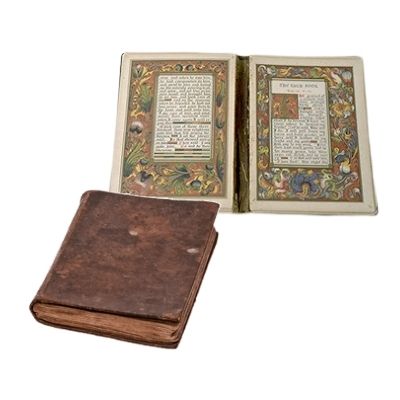
Viewable Storage Facility Project
One of the most important functions of a museum is to be a good steward of its resources held in the public trust. These resources for a history museum are its collections and archival holdings– what many people feel is the heart and soul of a museum– the collective history of a people or place. We use our collection to create exhibits that tell us stories about how our nation, our communities and our cultures came to be, and without museum collections, those stories could be forgotten. METC’s collection contains approximately 8,900 objects, textiles, archives, and other examples of the history of New Jersey’s early immigrants.
In 2019, this collection, housed in our historic building, was severely compromised by a mold infestation which was swiftly addressed and remediated. But to save the collection from any permanent damage, the museum fast tracked a long-range plan to create a new viewable storage facility that would house the entire collection in a modern, environmentally controlled area in the museum. Funded by generous grants from the NJ Historic Trust, NJ Historical Commission and the Madison Open Space, Recreation and Historic Preservation Trust, METC is in the midst of the feasibility study phase of this multi-year plan. The study will create a design plan, construction documents, and specify needed collection storage for the next phase in the creation of this facility.
We still have a long way to go with this complex and critical project, but we are excited that our collection will finally be properly stored, cared for and inventoried. And these bits of history will continue to be preserved so they can speak for us all and tell the complete stories of the many diverse people who lived and worked here; creating our communities and the place we call home.
Frequently Asked Questions
METC collects and preserves objects and historic records made or used in New Jersey or the surrounding states (New York, Pennsylvania, and Delaware) during the 18th and 19th centuries. Objects with a known history or connect to a specific individual, company, shop, or family are of particular interest to METC.
If you are interested in donating an object to METC please fill out the donation form below or email [email protected] with the object type, description, date, maker information, provenance (history), materials, and photographs of the object. The Curator of Collections will review your donation and respond to your inquiry.
Please do not drop off or send any original materials or artifacts to the Museum until you have been contacted by the Curator of Collections.
METC actively collects historic objects (hand tools, final products, production surfaces), archival material, or rare books relating to historic trades, home and farm life from the 18th and 19th centuries. These historic artifacts and archival materials must have been made or used in New Jersey or the surrounding states (New York, Pennsylvania, and Delaware). METC finds specific interest in objects with a known history, who made or used them, and where and when.
METC does not accept donations through the mail or in person unless prior arrangements have been made with the Curator of Collections.
If you interested in donating your object(s) to METC, please fill out this form. Our Curator of Collections will review your donation and respond to your inquiry.
The process can take approximately 3-4 months. All donations must be reviewed by the Curator of Collections, Collections Committee, and Board of Trustees. Donation recommendations are presented to the Collections Committee and Board of Trustees quarterly.
Following the Board’s approval of the donation you will receive a Deed of Gift form, documenting the transfer of ownership of the object(s) to METC.
The Museum cannot provide appraisals of the monetary value of artifacts proposed for donation or for any other reason. The Internal Revenue Service regards museums and libraries as interested parties. To find a licensed appraiser in your area, contact one of the following organizations for a referral: the American Society of Appraisers, the International Society of Appraisers, or the Appraisers Association of America.
METC does not guarantee that donated artifacts will be put on display. We rotate our Main Gallery exhibit space approximately twice a year, but only a small percentage of the entire collection is on view at a given time. Donations that are not on view are well cared-for in our collections storage room and used for research and programmatic initiatives.
Currently only 15% of the collection is displayed in gallery spaces throughout the museum. METC rotates exhibits in the Main Gallery space approximately twice a year. The collection is also used for education programs, social media content, and research purposes. Some objects donated to the Museum will be used in the Education Collection. This collection is actively used in educational programs and hands-on demonstrations to further the Museum’s educational mission.
Due to COVID-19 regulations and a collections rehousing plan, we have temporarily suspended appointments for donors to visit our collections storage facility. Please contact the Curator of Collections, [email protected], if you have any questions.
METC may, with the approval from the Collections Committee and Board of Trustees, remove historic objects and other materials from the collection through a process called deaccessioning. This is a formal process of removing an accessioned object from the Museum’s permanent collection. Deaccessioning is a way museums can improve and strengthen their collection by refining, upgrading, and refocusing on the collection. Objects that conform to the deaccessioning criteria are outlined the METC’s Collections Management Policy. For example, objects may be outside of the scope of collections, deteriorated beyond recognition, or be redundant. Deaccessioned material may be transferred to another museum or cultural/educational organization, transferred to METC’s Education Collection, sold, or destroyed. Any funds gained from the sale of deaccessioned items are placed in a restricted fund to be used for care and preservation of the Permanent Collection.
No, but METC recommends you locate a conservator in your area by utilizing the American Institute for Conservation “find a conservator” search method. Through this website you can locate a conservator in your area and by specialty. If you are interested in online resources to provide tips on how to care for your historic objects, please visit: Smithsonian Museum Conservation Institute, National Park Service, or the American Institute for Conservation.
METC’s Permanent Collection, Archives, and Research Library are open to qualified researchers by appointment only. Please review the Research Request Form. Upon reviewing the form, please fill out the necessary fields and email a copy to [email protected]. Please understand that submitting your request for an appointment is not a confirmation of your reservation. The Curator of Collections will review and process each request in order received and will contact you to confirm a scheduled date and time.
METC Collection Donation Form
If you interested in donating your object(s) to METC, please fill out the below form. Our Curator of Collections will review your donation and respond to your inquiry.

